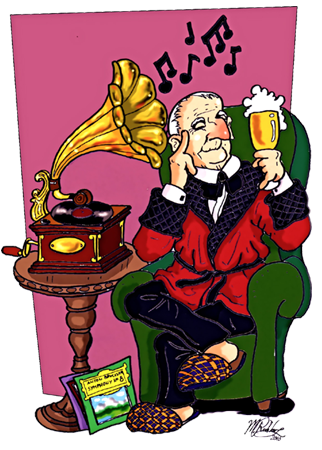An Interview with Cornelis van Zwol (1935-2020)
Bruckner lebt! An interview with a Bruckner expert 15. July 2013 Genius, bumpkin, bon vivant? What kind of man was Anton Bruckner? We asked someone who should know: Cornelis van Zwol is a well-known Bruckner expert. How did Bruckner live? He liked to work and worked a great deal, composing the entire day. In the evenings, he went to a pub. He liked to eat and ate a lot. Smoked ham with dumplings was his favorite dish, accompanied by a goodly number of pints 15, 16 was not unusual. What kind of person was he? There are many different theories one needs to be careful. Some think that he was a somewhat awkward loner, but I don't think that's true. Evenings in the pub, he drank and had discussions with his students. They liked him. He was a teacher who liked to give solid, vivid examples. And he was also very sociable. But Bruckner was never at home in the Viennese cultural scene... He had influential opponents in Vienna the conservative clique that surrounded the critic Eduard Hanslick, who always tore his music to pieces. They considered Bruckner a Wagnerian and therefore, refused to give him any recognition. It was only after his big successes in Germany, 1884 in Leipzig and 1885 in Munich, that the Viennese began to appreciate him and his music. But he never really felt at home in the Viennese salons. He was from the provinces, and he did not dress very fashionably he always wore the same suits. Is that why his love life was not successful? That's not really true. He was even engaged once in Berlin, but the lady was Protestant and therefore, a marriage was impossible. Bruckner always idealized women; he always fell in love with young girls he was somewhat insecure with more mature women. But his love letters to the young ladies were never successful. The love that remained a force in his life was his love for God and music. Anyone who wants to enjoy Bruckner's music must fully engage with it. Bruckner lived for music. Can one say that? Yes, definitely. He was a music fanatic; music was everything to him his life and his path to God. Originally, he was a great improviser on the organ. And then, after decades of studying the musical works of others as well as harmony and counterpoint, he began to compose. Bruckner was also very knowledgable about music, but he knew very little about history and literature. It is said that he only had five or six books on his bookshelf. What is it that makes Bruckner's music so unique? In our time where people are looking for distraction, for lightness, Bruckner's music does not have an easy time of it. But this was always the case because his music is very spiritual. It is music that does not give up its secrets easily; his adagios, for example, are almost like a prayer. It is not surprising that Bruckner's music is infused with religion; after all, he began as an organist in St. Florian and in Linz. His symphonies are very long; were they too long for his era? Well, look at it this way, his adagios alone often last half an hour; his symphonies are 80, 85 minutes long. This is really very long. At the time, people at least in Vienna could not handle that. But he simply had a lot to say. After all, he came from a rural area where people had time and where life was not hectic. Bruckner really sounds very edifying... That's true it is very Austrian music. In addition to its religious aspects, his music also has very incisive, "demonic" passages and his scherzos originate in dance music, the Ländler country dance. As an adolescent, Bruckner played his fiddle in pubs. By the way, he nicknamed his first symphony "Das kecke Beserl," which translates roughly as "The saucy maid." |







